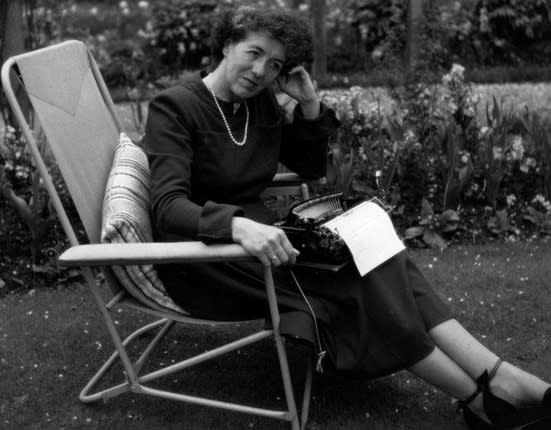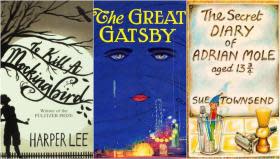Nostalgia for Enid Blyton does not grant her a free pass for her bigotry

A bunch of grown-ups are stamping their feet over a dead children’s author. Why? Because the Royal Mint are mean and nasty, and they don’t want to celebrate a racist bigot.
You’d think there were more pressing issues to get upset about, like the fact that the Amazon rainforest is burning at an unprecedented rate, but no, a Mail Online story has revealed that the Famous Five author was described as a “racist, sexist homophobe and not very good writer”. So they wouldn’t feature her on a commemorative 50p coin.
Cue the uproar. “A scandal,” The Telegraph declared. “She was a genius, not sexist!” As though you can't be both (hi Picasso, Frank Sinatra, Hemingway, Eminem, TS Eliot, Dylan Thomas, Gore Vidal, Norman Mailer. Charles Bukowski…) Breitbart writer James Delingpole was practically frothing at the mouth in his piece about how the Left has RUINED BRITAIN, putting the word “racist” in quotation marks – as if there were any question of the motivation behind Blyton’s naming of her three black doll characters in The Three Golliwogs as “Golly”, “Wolly” and “N****r”. Professional troll Toby Young tried to make a joke about the Mint being transphobic.
Meanwhile, Good Morning Britain’s Richard Madeley used the good old-fashioned “that’s how it was back then” excuse as a defence for Blyton’s regressive views. Sorry to break it to you, Richard, but black people and gay people existed before 1955, and ignorance is not an excuse for outright discrimination and cruelty towards other people. Being old does not give you a free pass for bigotry.
I never liked Blyton's books as a child, although I had a brief soft spot for Noddy in his little yellow car. But I detested the Famous Five books, finding Blyton's heroes to be stuffy and pompous, with an unpleasant attitude to characters different to them. They’re entitled brats: in one scenario they go to the house of a new mother with a messy house and order her to sort it out. In the Wishing Chair books, there’s a naughty imp called “Chinky”. My grandmother had a golliwog doll from when she was a child and I remember thinking its features - that rictus grin and blank, staring eyes – were rather grotesque.
In a time when a miserable one per cent of children’s books in the UK have a black or ethnic minority main character, you can understand why the Royal Mint would be reluctant to celebrate an author known for stories about five white children and their encounters with characters deemed “villains” because of their outsider status – "gypsies", "tinkers"... in 2017 an article on Blyton and Brexit pointed out a "checklist" for her villains that included references to dark skin and dark eyes and a "foreign" accent.
The comment about her “not being very well-regarded” was likely referring to her status in literature, rather than her success as a children’s author (she has sold more than 600 million books). Blyton was not known for her literary ability – her own daughter, Imogen, once commented: “She wrote as a child with an adult’s writing skills. She saw everything in black and white. She was emotionally immature.”
The Royal Mint did the same thing last year with Roald Dahl, who while being a hugely popular children’s author also held anti-Semitic views – once telling the New Statesman: “There is a trait in the Jewish character that does provoke animosity. I mean, there’s always a reason why anti-anything crops up anywhere; even a stinker like Hitler didn’t just pick on them for no reason.”
Incidents like this, if anything, force us to confront the realities of our heritage – the opprobrium shows how willing people are to whitewash (quite literally) the past and instead recall it as some kind of tea-and-crumpets bonanza where children played in the streets and everyone had picnics in the park on Sundays. Take a moment to recall the uproar at a viral tweet this year that “revealed” that John Wayne was a racist, a homophobe and a misogynist. This revelation came from an interview published half a century ago, where he called the film Midnight Cowboy “perverted” because it was a “story about two fags”. The reaction this year was one of such shock that it bordered on embarrassing – but it also felt like a symptom of the erasure of Wayne’s problematic traits until he was reduced to a one-dimensional American icon.
Read more
The 40 best books to read before you die
That emotional immaturity mentioned by Blyton’s daughter is exactly what drives the uproar over ludicrously unimportant matters such as this. In a way, Blyton’s childishness in her writing is what made her so successful, as it was for Lewis Carroll, CS Lewis, and Dahl, who once said the children’s author “must like simple tricks and jokes and riddles and other childish things”. She created idyllic landscapes where the sun always shines and there are lashings of ginger beer or, in the words of Helena Bonham Carter, who played Blyton in a 2009 BBC drama: “She retreated to a place where life was lovely and carried on creating that world.
“She didn’t want to deal with anything that interrupted it. In her personal life she was cruel by accident because that’s what she needed to keep herself afloat. Hilariously, and almost insanely, she reinvented facts that she didn’t like. She just wanted to carry on creating this fantastic world that, actually, millions of others wanted to escape to because it was so convincing.”
It all sounds painfully familiar, doesn't it? It takes courage to face up to the reality that some of our most beloved cultural figures were not as endearing as the characters they created, and to refuse to talk about them today as though they were old dears who didn’t know any better. In all of these cases, the outrage comes from those who confuse nostalgia with denial; people who remember the scenes Blyton depicted in her books – those sunny meadows, forest glades – and think it was all real, and resent anyone who points out the truth. People who want their artists to be free of any negative traits because they feel it prevents them from being able to appreciate the art. But racism is racism, and it takes wilful ignorance – like a child covering its eyes to avoid the monsters – not to see it.
Read more
Read more The 40 best books to read before you die
Enid Blyton 50p coin blocked because author was ‘racist homophobe’
Enid Blyton 50 years on: Let’s be more critical about classic books



